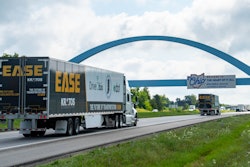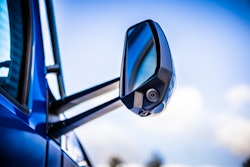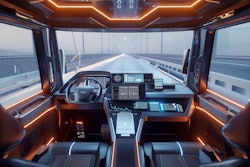Trucking news and briefs for Monday, April 21, 2025:
Daimler, Torc begin fleet testing for autonomous trucks
Daimler Truck North America (DTNA) announced last week it has started delivering its latest flagship on-highway trucks to the autonomous testing fleet of Torc Robotics, a subsidiary of Daimler Truck.
DTNA said these trucks are based on the recently unveiled fifth-generation Freightliner Cascadia, which was introduced last year. The autonomous-ready version of the new Freightliner flagship is equipped with redundant safety features like braking and steering and is intended for series production.
“Delivering the latest iteration of our autonomous-ready vehicle platform, including production-intent autonomy hardware to Torc, marks a significant milestone for Daimler Truck towards series maturity and scaling,” said Joanna Buttler, head of Autonomous Technology Group at Daimler Truck.
Torc completed driver-out test runs on a multi-lane test track in Texas last year, DTNA said, adding that the next step for DTNA and Torc is to further develop autonomous trucks to safely achieve the driver-out capability on public roads.
“Our strong collaboration with Daimler Truck represents six years of success in advancing the future of freight. Fully integrating Torc’s autonomous driver with Daimler Truck’s Freightliner Cascadia platform creates an industry-first, scalable, physical-AI autonomous trucking solution,” said Peter Vaughan Schmidt, Torc CEO. “This will unlock tremendous value for our customers by addressing key industry pain points and presents a clear opportunity to generate revenue and drive meaningful transformation across the industry.”
In addition to existing test routes in New Mexico, Texas and Arizona, these trucks will also be tested in autonomous mode on a new lane in Texas between Laredo and Dallas, mainly on I-35, DTNA added. There is significant freight volume moving between Laredo and Dallas, connecting major cities like San Antonio and Austin.
Torc recently announced it has signed a leasing agreement for an autonomous hub in the Dallas-Fort Worth area. This hub will serve as the operational base for its autonomous testing efforts, customer freight pilots and future commercialization.
Looking ahead, DTNA and Torc said they aim to enter the U.S. market with SAE Level 4 autonomous trucks by 2027. In this application, the autonomous driving system takes over the entire dynamic driving task between two freight hubs.
[Related: How autonomous trucks will impact the trucking workforce]
Nevada considering increase to minimum liability insurance requirement
Lawmakers in Nevada are considering doubling the minimum liability insurance requirement for intrastate motor carriers over the next five years.
The legislation, introduced by state Sen. Edgar Flores, as introduced would have increased the requirement to $1.5 million for intrastate carriers. An amendment to the bill, approved by the Nevada Senate Growth and Infrastructure Committee, staggers the increase. As amended, the bill would increase the liability insurance minimum to $1 million by Jan. 1, 2026; to $1.25 million by Jan. 1, 2028; and to $1.5 million by Jan. 1, 2030.
In introducing the legislation to the committee, Flores said he and supporters of the bill do not believe the $750,000 minimum is sufficient to cover medical and other crash-related costs in today’s economy.
The Nevada Trucking Association voiced its opposition to the bill and highlighted that requiring the increase for intrastate motor carriers would only help in a small number of situations.
NTA CEO Paul Enos said that, according to the Federal Motor Carrier Safety Administration Motor Carrier Management Information System, there were 5,702 truck crashes recorded in Nevada between 2018 and the end of February 2025. Of those, 1,730 (30.3%) involved carriers based in Nevada, and just 421 (7.38%) were tied to Nevada-based intrastate carriers who would be impacted by the legislation.
“These numbers highlight that intrastate carriers are a small fraction of the overall issue,” Enos added in a letter opposing the bill. “Yet, SB 180 targets them with a doubling of insurance minimums, impacting over 3,600 Nevada-based businesses -- household goods movers, tow operators, and trucking companies serving construction, agriculture, garbage, and food and beverage industries.”
Enos advocated that any changes to liability insurance requirements for the trucking industry should occur at the federal level.
[Related: Why insurance premiums keep rising, and what fleets can do about it]
The insurance industry also came out in opposition to the bill. The American Property Casualty Insurance Association (APCIA) doubling insurance requirements for trucking companies “could make it very difficult for truckers in Nevada to get insurance. Most insurers will not write coverage above $1 million on the primary layer, and most truckers are written at that level anyway.”
The group added that coverage beyond $1 million “would have to be written as some form of excess policy or umbrella,” requiring companies to hold more than one insurance policy. “This could be especially difficult for trucking, where insurers and reinsurers had become careful about how much exposure they would take on for a single trucking company, as the numbers of very large claims grew over the last 20 years,” APCIA added.
APCIA also noted would make the cost of insurance for trucking companies, if it was even available “significantly higher, which would increase the cost for all goods that Nevadans buy, since everything travels by truck. The bill’s provisions would also act as a barrier to entry for new truck drivers who most likely would not be able to obtain the required insurance.”
New Jersey is currently the only state in the U.S. that requires higher liability insurance minimums that the federally-required $750,000.
[Related: New Jersey doubling liability insurance minimums]
Small fleet’s coil-securement waiver renewed
The Federal Motor Carrier Safety Administration has renewed and modified a small fleet’s exemption that allows the company to secure large metal coils to its trailers using a cargo securement system that differs from that required by the Federal Motor Carrier Safety Regulations (FMCSRs).
Delta, Ohio-based K&L Trucking first received the waiver in 2020 allowing its trucks to transport coils from North Star Blue Scope Steel to Fulton County Processing -- which are less than two miles apart -- using an alternative securement method. Last year, the company requested a renewal of the waiver\, as well as an expansion of the waiver for transportation to and from other points within a few miles of each other.
The exemption allows the use of a specialized metal coil carrier permanently attached to the flatbed trailer using sixteen 5/8-inch Grade 8 bolts, each rated to hold 27,611 pounds. The coil carrier serves to distribute the coil’s weight while securing the coil and preventing rolling during transport.
Rather than using the four chains required by federal regulations to prevent the coil from moving forward or backward, K&L uses a large, single, 2-ply synthetic strap with Kevlar protective coating rated with a working load limit of 44,800 pounds routed through the eye of the coil and securing each coil to the coil carrier.
Under the expanded exemption, K&L can use the alternate securement method to transport at no more than 40 miles per hour to and from the following locations in Delta, Ohio: North Star Blue Scope Steel; Fulton County Processing; Worthington Industries; Nova Tube & Steel; and Bluescope Recycling & Materials.
[Related: Fleet seeks waiver to allow alternative steel coil securement method]











